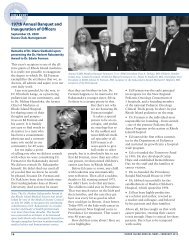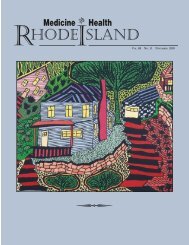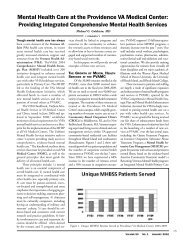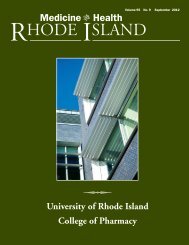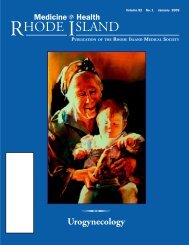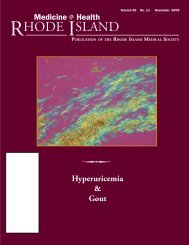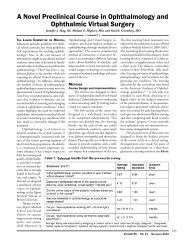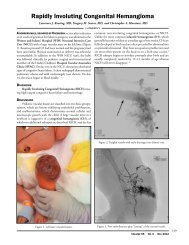The Providence VA Medical Center - Rhode Island Medical Society
The Providence VA Medical Center - Rhode Island Medical Society
The Providence VA Medical Center - Rhode Island Medical Society
- No tags were found...
You also want an ePaper? Increase the reach of your titles
YUMPU automatically turns print PDFs into web optimized ePapers that Google loves.
12Disease. Taken together, these efforts are intendedto complement the efforts of theclinic team, improving compliance and patientsatisfaction.MEDICINE & HEALTH/RHODE ISLANDpointments needed on fixed clinic days toaccommodate the difficulties many homelesspersons have keeping appointments setwithin narrowly defined times. <strong>The</strong> SMIclinic is co-located within the outpatientmental health unit and runs concurrentlywith scheduled mental health appointmentsto create a more seamless transition frommental to physical health service delivery. (2)All the clinics also have case managementincorporated into their care models with theuse of patient registries to minimize loss tofollow-up. (3) Care within the clinics is tailoredto issues relevant to that population.For example, the initial assessment at thehomeless clinic specifically queries patientson food security, current sheltering needsand benefits status. <strong>The</strong>re is also amultidisciplinary team on-site during clinicdays that includes primary care, a <strong>VA</strong> housingcoordinator, a <strong>VA</strong> benefits representative,and a mental health practitioner. <strong>The</strong>Geriatrics Clinic has specific assessments andsupports for caregivers of those veterans sufferingfrom Alzheimer’s Disease and othercognitive impairments. (4) Lastly, each clinicteam is trained in care nuances and prioritiesrelevant to that population. For thehomeless clinic, the emphasis is on harm reduction;for women’s health, on integratedPTSD and MST related care needs, etc.To date, over 800 patients are enrolledin these “special-populations enhanced medicalhomes” with significant clinical outcomesto date. In all four clinics primary care contactsper patient have increased significantlyand the rate of potentially preventable, ambulatorysensitive admissions (e.g., congestiveheart failure, COPD) among patients transferredto these clinics has declined by 12%.Chronic disease management has also significantlyimproved; less than 40% of thepatients in the SMI and homeless cohortswere at lipid target (LDL 80 years old, many of whomare cognitively impaired, frail, and at highrisk for hospitalization and institutionalization.11 Together, these four groups havesubstantially more co-morbidity, use emergencydepartments and inpatient medicalservices at much higher rates and have muchworse health outcomes.As part of the reorganization of the<strong>Providence</strong> <strong>VA</strong>MC Primary Care Service, wetailored clinical programs based on the<strong>Medical</strong> Home model to better engage eachof these “high risk populations” in treatmentand to optimize clinical and social outcomes.<strong>The</strong> Homeless Oriented Primary Care Clinicwas established in November, 2006 followedby the Geriatrics Primary Care Clinic in July,2007. A clinic for female veterans sufferingfrom PTSD or military sexual trauma wasalso started in 2007. <strong>The</strong> Serious MentallyIll (SMI) clinic, co-located with mentalhealth, was established in the Fall of 2007for patients with serious persistent mental illnesseswho were unable to successfully accessand/or navigate the general medicineprimary care clinics. <strong>The</strong> clinics are definedby four consistent features: (1) Access to careis modeled after the needs of that population.For example, the homeless clinic operatesas an open-access model with no apansand those new veterans returning homefrom Iraq and Afghanistan, and the needto provide care in a patient-centered, evidence-basedand cost-efficient manner.Health care delivery in the United States isat a watershed moment as policy leadersgrapple with burgeoning costs, disparateaccess and inadequate outcomes. <strong>The</strong> <strong>VA</strong>system serves as a model for what can beaccomplished and should be referenced inthe ongoing health care debate.REFERENCES1. Agha Z, Lofgren RP, et al. Are patients at VeteransAffairs <strong>Medical</strong> <strong>Center</strong>s sicker? Arch Intern Med2000;160:3252-7.2. Longman P. Best Care Anywhere: Why <strong>VA</strong> healthcare is better than yours. PolipointPress, Sausalito,CA. 20073. Asch SM, McGlynn EA, , et al. Comparison ofquality of care for patients in the Veterans HealthAdministration and patients in a national sample.Ann Intern Med 2004;141:938-45.4. www.acponline.org/running_practice/pcmh/demonstrations/jointprinc_05_17.pdf5. Bodenheimer T, Wagner EH, Grumbach K. Improvingprimary care for patients with chronic illness.JAMA 2002; 288:1775-96. Coleman K, Austin BT, et al. Evidence on theChronic Care Model in the New Millennium.Health Affairs 2009; 28:75-85.7. Lorig KR, Ritter P, et al. Chronic disease self-managementprogram. Med Care 2001; 39:1217-23.8. O’Toole TP, Conde-Martel A, et al. Health care forhomeless veterans. J Gen Intern Med 2003 18:929-339. Kilbourne AM, McCarthy JF, , et al. Access to andsatisfaction with care comparing patients with andwithout serious mental illness. Int J Psychiatry Med2006;36:383-99.10. Frayne SM, Yu W, et al. Gender and use of care:planning for tomorrow’s Veterans HealthAdminstration. J Women’s Health (Larchmt)2007;16:1188-99.11. Selim AJ, Berlowitz DR, et al. <strong>The</strong> health status ofelderly veteran enrollees in the Veterans Health Administration.J Am Geriatr Soc 2004;52:1271-6.Thomas P. O’Toole, MD, is Chief, PrimaryCare Service, <strong>Providence</strong> <strong>VA</strong> <strong>Medical</strong><strong>Center</strong>, and Associate Professor of Medicine,<strong>The</strong> Warren Alpert <strong>Medical</strong> Schoolof Brown University.Disclosure of Financial Interests<strong>The</strong> author has no financial intereststo disclose.CORRESPONDENCEThomas P. O’Toole, MD<strong>Providence</strong> <strong>VA</strong> <strong>Medical</strong> <strong>Center</strong>830 Chalkstone Ave.<strong>Providence</strong>, RI 02908e-mail: Thomas.O’Toole@va.gov




